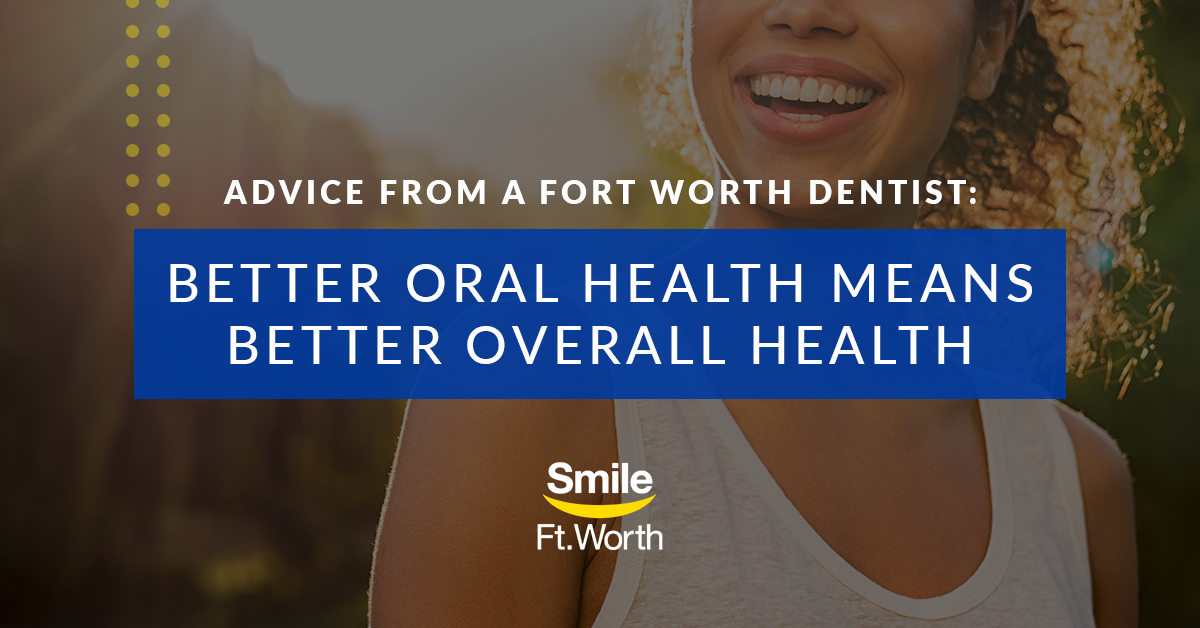Your mouth says a lot — about your health, that is.
Sound surprising? We’ll explain.
The fact is, your oral health has a profound impact on the health of the rest of your body. Still, a trip to the dentist is often the one healthcare visit that’s put off most.
Perhaps patients are struggling with dental anxiety (we have a few tips for that), or perhaps it’s due to pandemic-era wariness. Whatever the reason, learning about your oral health’s impact on the rest of your body may just be the motivation you need to finally get that appointment with your Fort Worth dentist on the books.
Today we’re taking a closer look at why better oral health can translate to better overall health and some of the problems that can arise if it is neglected.

Health Problems Linked to Poor Oral Health
The culprit of many of the myriad health problems that are linked to poor oral health tends to be bacteria. And it’s no surprise, really. The mouth is the gateway to your respiratory tract and digestive systems.
In general, the bacteria that call your mouth home are harmless (or even helpful). But when oral hygiene isn’t prioritized, bacteria can reach dangerous levels that could cause infections like periodontal disease or tooth decay.
Your saliva also plays a vital role in protecting you from potentially harmful microbes that could cause disease elsewhere in the body. Without proper oral health (or if certain medications like decongestants, antihistamines, antidepressants, and others are taken), saliva flow can be reduced, limiting its ability to protect you.
Respiratory Infections
Since we spend so much time breathing through our mouths, it may not come as a shock to discover that an unhealthy mouth can lead to an unhealthy respiratory tract. These issues can include everything from bronchitis, pneumonia, and even Chronic Obstructive Pulmonary Disease — or COPD for short.
The culprit? As usual, it all comes down to the bacteria in your mouth that may be present due to an infected tooth or gums, which can enter your bloodstream and wreak havoc.
Cardiovascular Disease
It may be surprising, but poor oral hygiene has been linked to heart disease. When the same bacteria that is responsible for periodontal disease travels through your bloodstream, it can lead to excess plaque in the arteries, leading to atherosclerosis. This can, in turn, cause highly dangerous blockages or problems with blood flow, all of which increase your risk for a heart attack, high blood pressure, and even stroke.
Endocarditis
Endocarditis is a rare but potentially fatal condition that can arise as a result of cardiovascular disease (and, as a result, poor oral hygiene). It happens when bacteria originating from other parts of your body, such as your mouth, infect the endocardium — the inner lining of your heart chambers — via the bloodstream.
Gum Disease and Diabetes
While gum disease doesn’t cause diabetes, people with diabetes tend to suffer from gum disease at a higher rate than those without it. Gum disease can also prevent unique challenges to patients with diabetes as it’s been known to raise blood sugar levels. In diabetic patients, this makes their condition more difficult to control.
Conversely, when gum disease is controlled, individuals with diabetes may also find that their sugars are easier to control as well.
Infertility and Pregnancy Complications
Infections are critical to avoid when trying to conceive or when pregnant. Unfortunately, the hormonal changes that women endure during pregnancy can make them more prone to oral infections. For this reason, women who are planning a family or who are currently pregnant should take extra precautions when it comes to maintaining good oral hygiene.
Poor oral health and infections like gingivitis have been linked to infertility as well as problems like premature birth or low birth weight. Scheduling appointments during your pregnancy with a Fort Worth dentist can keep oral bacteria in check and give you peace of mind for your baby.
Depression
The connection between oral health and overall health is not simply limited to conditions of the body but also the mind. Again, the link between depression and oral health is not truly a chicken-or-egg question. Poor oral hygiene didn’t necessarily cause depression. Instead, the behavioral effects of individuals suffering from depression, anxiety, and stress may lead to a decline in overall oral health.
This decline (and the periodontal disease, unsightly teeth, and bad breath that often comes with it) can, in turn, lead to decreased self-esteem and confidence.
Memory Loss
A report in the Journal of Neurology, Neurosurgery, & Psychiatry showed a link between gingivitis and decreased memory and cognitive skills. They compared the performance on memory and cognitive skills tests by those with unhealthy gums to those with a healthier mouth.
In particular, subjects with gingivitis tended to perform poorly on delayed verbal recall and subtraction.
Kidney Disease
Like diabetes, poor oral health may not lead to kidney disease, but it presents a different set of risks and challenges for those who suffer from it. Furthermore, patients with kidney disease seem to be more prone to developing oral health issues. Because of the potential harmful systemic effects of inflammation caused by prolonged infection (such as the type of bacterial infection that is often to blame for cavities or other oral health issues), patients with kidney disease will need to take extra care.
In fact, if a patient is a candidate for a kidney transplant, they will first need to be cleared of infection during a dental health exam. If the patient cannot be cleared, they may not be able to receive the transplant they need. This is due to the fact that certain medications that suppress the immune system will need to be administered following the transplant to maximize the chances of a successful transplant.

How to Stay on Top of Oral Health
We all want a brilliant smile, fresh breath, and straight teeth. But beyond the cosmetic benefits of a healthy mouth, keeping up with good oral hygiene practices offers a host of other benefits, including:
- Improved memory
- Healthier pregnancy
- Improved fertility
- Lower blood sugar levels
- Improved self-esteem
Floss daily
We often hear that patients are afraid to floss because they may experience some bleeding in their gums. The thing is, it’s flossing that can actually work to prevent that bleeding — often caused by gingivitis — to begin with.
Flossing properly involves more than loosening any food that may be stuck between your teeth. For optimal gum health, it’s essential to go deeper. As the floss reaches the base of the tooth, curve it into a “C” shape so it can enter the space between your tooth and your gums.
Make sure you’re using a clean section of floss for each tooth. If you use floss picks, you’ll likely need to use several of them in one session to avoid spreading any potentially dangerous germs.
Brush Regularly and Keep Your Toothbrush in Good Condition
The general recommendation is to brush at least twice daily using fluoride toothpaste and to replace your toothbrush every three months. Additional brushing between midday meals can also help promote good oral health.
Mouthwash can be used following brushing and flossing to remove any leftover food particles or other debris and to leave your breath fresh.
If you’ve been putting off a visit to a Fort Worth dentist, get one on the books today.
Even if you don’t remember the last time you went to the dentist (it happens more often than you think), don’t fear that your dental team will judge you. At Smile Fort Worth, we understand dental health comes with anxiety for many people. Here, you’ll find compassionate care and a team of professionals who are just excited to help you get back on the path of oral health.
If you are new to the area or just in need of a new Fort Worth dentist, schedule an appointment today online or over the phone.
Contact Smile Fort Worth
Plan Your Next Visit to Our Office.







Recent Comments